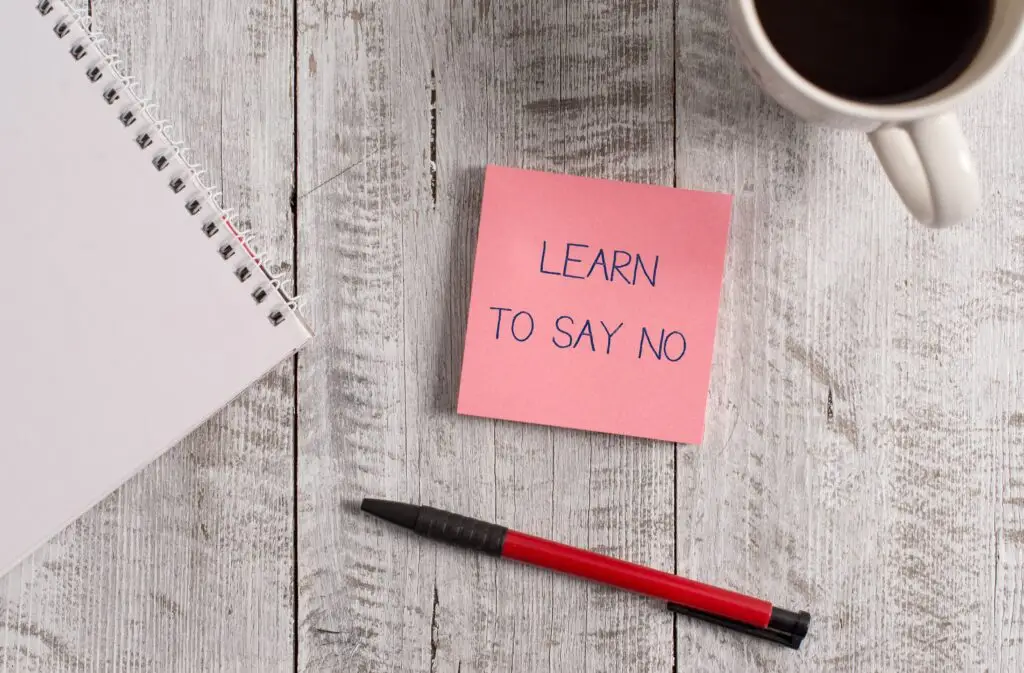How to Say No Confidently and Reclaim Your Life Balance

A Permission Slip to Protect Your Time, Energy, and Sanity Do you often find yourself overwhelmed, exhausted, or resentful because your calendar is filled with commitments you wish you’d never made? If this scenario sounds familiar, you’re not alone. Protecting your time and energy is crucial for a balanced life, yet many of us struggle to say “no.” Learning this powerful two-letter word can dramatically enhance your life quality. Here’s why—and how—you can master it. The Hidden Cost of Saying Yes Saying “yes” might seem harmless at first. It feels good, brings smiles, and earns you approval from friends, family, and colleagues. But too often, each “yes” adds another invisible weight to your shoulders. Before long, your calendar becomes crowded with obligations you can’t fulfill without sacrificing personal well-being or family time. Consider Alison, a busy professional juggling family responsibilities and her career. When a friend asked for help organizing a reunion, she initially said “no,” recognizing her bandwidth limits. Yet somehow, she found herself managing every detail, driven by the positive feedback loop of helping others. This scenario is incredibly common and illustrates how easily we surrender control over our time and energy. Why Saying No Feels So Difficult Several psychological and social factors make saying “no” challenging: The Essential Skill for a Well-Balanced Life Mastering the art of saying no is not merely convenient—it’s essential. Without the ability to set clear boundaries, you risk losing yourself in an endless stream of demands, ultimately compromising your health, relationships, and personal goals. If you consistently fail to say no, your life quickly becomes filled with obligations that drain your energy and diminish your happiness. Over time, this leads to burnout, chronic stress, and strained relationships. Understanding Resentment and Its Impact Resentment is a bitter emotional state that arises when you feel forced or trapped into doing something against your will. It’s often the silent price you pay when you continually say yes out of guilt or obligation rather than genuine willingness. Resentment can manifest as irritation, anger, or a simmering frustration directed towards others—or even towards yourself for not honoring your own boundaries. When resentment builds, it doesn’t just impact your mood; it shrinks your life quality by contaminating your interactions with negativity. Relationships can suffer as hidden frustrations become visible through short tempers or passive-aggressive behaviors. Resentment can also erode your self-esteem because it reinforces a sense of powerlessness and lack of control over your own life. The Power of Saying No Saying “no” isn’t selfish; it’s essential. It safeguards your energy, mental health, and overall happiness. As Irina, a busy professional and mother, noted, it often takes experiencing the consequences of too many “yeses” before recognizing “no” as a complete sentence. Indeed, setting boundaries through strategic refusals creates space for meaningful yeses—commitments aligned with your values and priorities. Practical Strategies to Make Saying No Easier Fortunately, you can cultivate the skill of saying no with these practical steps: Adopt policies or rules that govern your responses to common requests. Cindi, a busy editor, established a company policy against writing book blurbs to easily manage frequent requests. Similarly, Nina limits herself to one significant volunteer commitment per year. Such policies eliminate emotional decision-making in the moment. When a request comes in, resist the urge to immediately answer. Instead, give yourself permission to say, “Let me think about it.” This pause helps you evaluate your actual bandwidth and priorities, avoiding reflexive agreements driven by the desire to please. When declining, clarity is your ally. There’s no need for extensive explanations. A simple, polite refusal—”I appreciate the offer, but I can’t commit right now”—is sufficient. Over-explaining can weaken your position and open opportunities for persuasion. Build your “no” muscle gradually by practicing in low-pressure scenarios, such as declining an optional social event or minor favors. With practice, you’ll build confidence in asserting your boundaries. Reframe saying “no” from an act of rejection to an act of self-care and authenticity. When you protect your time, you also show respect for your commitments, ensuring you deliver quality and presence in areas that truly matter. Embracing Your Inner Two-Year-Old Toddlers are infamous for confidently using the word “no.” While their usage might come with tantrums and defiance, their assertiveness teaches a valuable lesson: self-preservation. Channeling this spirit doesn’t mean becoming difficult or uncooperative. Instead, it means reclaiming autonomy over your life’s direction and pace. By saying no, you protect your time, energy, and mental health, creating space for the activities and relationships that genuinely enrich your life. Start today. Give yourself permission to say no and watch how your life transforms from overwhelming to intentionally fulfilling.
Your First 3 Moves to Get Unstuck

From Stalled to Started: The Research-Driven Roadmap to Reboot Your Momentum Have you ever found yourself caught in a cycle of overwhelm, feeling like you’re constantly reacting rather than intentionally acting? Maybe you’re exhausted from long workdays, frustrated by the nightly ritual of unhealthy takeout dinners, or weighed down by the endless pressure to keep it all together. You know you need to make a change—your energy, your health, and your happiness depend on it—but somehow, despite your best intentions, you’re stuck. You’re not alone. Feeling stuck is like being trapped in quicksand—the more effort you exert without strategy, the deeper you sink into inertia. Whether your overwhelm is professional, personal, or a blend of both, it’s a universally challenging experience. But here’s the good news: research shows that overcoming these feelings isn’t about relying solely on sheer motivation or willpower. Instead, it’s about deploying specific, strategic methods grounded in psychological science to convert inertia into incremental progress. Let’s explore three proven, research-based strategies that will help you start moving again and regain control: Move #1: Clearly Define Your Psychological Obstacle Renowned psychologist Mihaly Csikszentmihalyi, famous for his concept of “flow,” emphasizes that clear goals significantly reduce feelings of overwhelm. On the other hand, vague anxieties amplify feelings of helplessness. To get unstuck, you must precisely define the obstacle holding you back. A study published in the Journal of Experimental Psychology found that specifically naming your emotional state or issue helps reduce its negative impact by prompting cognitive processes that foster emotional management. Try this simple yet powerful exercise: write down exactly what’s making you feel stuck in one or two clear sentences. Is it constant anxiety over finances, a chaotic household, or uncertainty about your career? Naming the issue provides a clear mental target, reducing overwhelm and increasing your ability to manage the situation. Move #2: Harness the Power of Micro-Actions Large tasks or goals often trigger procrastination because they feel overwhelming. Nobel Prize-winning psychologist Daniel Kahneman reveals that humans have a cognitive bias toward immediate gratification and minimal effort. Consequently, big tasks naturally create resistance, keeping you stuck. Micro-actions, however, leverage your brain’s natural inclination toward easy and rewarding tasks. Breaking down your larger goals into small, manageable steps boosts your sense of self-efficacy—the belief in your ability to succeed. For example, if you’re stuck due to household clutter, don’t start by trying to reorganize your entire home. Instead, begin with one single drawer. If it’s work-related, focus first on completing just five minutes of brainstorming or outlining a single page. BJ Fogg, Ph.D., from Stanford’s Behavior Design Lab, highlights that “tiny habits” work effectively because they’re simple, achievable, and immediately rewarding. Each tiny success builds your motivation, dismantling barriers and building a habit of consistent productivity. Move #3: Schedule and Create Rituals for Your Actions Psychological studies affirm that intention alone rarely leads to action; structured planning and habit formation are essential. According to researcher Peter Gollwitzer, who extensively studied goal attainment, defining exactly when, where, and how you’ll act significantly boosts the chances of follow-through. Scheduling your actions turns abstract intentions into concrete commitments. For maximum effectiveness, link these scheduled micro-actions to consistent daily triggers, such as enjoying your morning coffee or winding down after dinner. Ritualizing your actions reduces mental friction and increases your likelihood of follow-through by conditioning your brain to associate certain cues with specific actions. Integrating These Strategies: Your Path Forward Combining clearly defined psychological obstacles, strategically executed micro-actions, and deliberately scheduled rituals forms a robust, scientifically-backed framework for overcoming inertia. This comprehensive approach doesn’t merely offer temporary relief—it equips you with durable, practical tools to sustain ongoing success. Take the first step today: clearly identify your primary obstacle, choose one micro-action, and schedule it into your routine. These small, consistent steps build lasting momentum, helping you regain your sense of control, accomplishment, and personal fulfillment. You’ve got this—it’s time to get unstuck.
21 Polite and Playful Ways to Say No Without Guilt

Saying “no” can feel like one of the toughest tasks in life—especially when there’s a genuine desire to help or a fear of disappointing others. But saying yes to everything often leads to overwhelm, stress, and even burnout. Learning how to gracefully, humorously, or firmly decline requests can empower anyone to reclaim their time, energy, and sanity.
How to Say No Confidently and Reclaim Your Life Balance

Do you often find yourself overwhelmed, exhausted, or resentful because your calendar is filled with commitments you wish you’d never made? If this scenario sounds familiar, you’re not alone. Protecting your time and energy is crucial for a balanced life, yet many of us struggle to say “no.”

